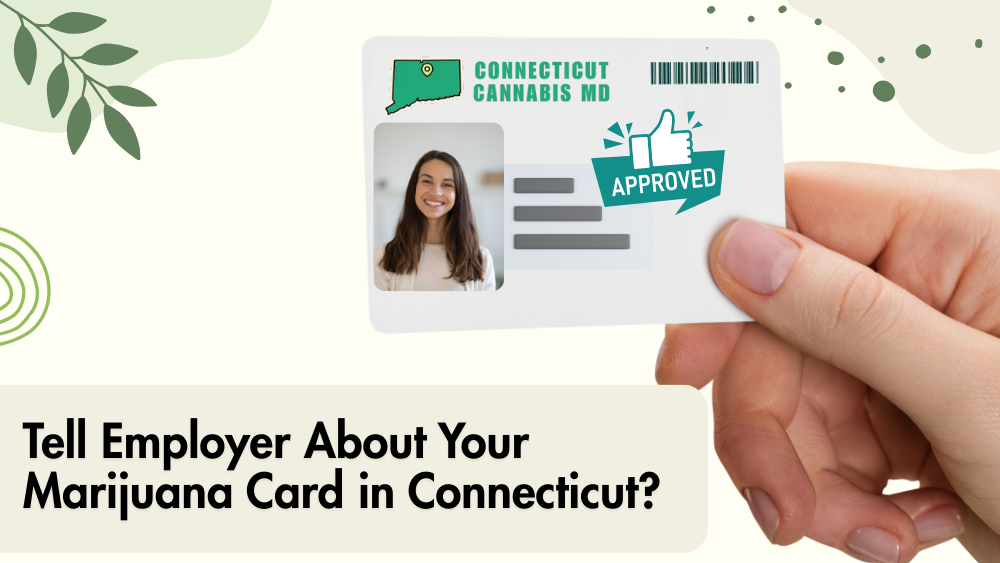In Connecticut and many other states, medical marijuana is legal, offering patients relief from conditions like chronic pain, anxiety, and more.
However, for employees who use medical marijuana, there’s often a lingering question: Should you disclose your medical marijuana card status to your employer? The decision is complex, as it involves considerations of privacy, potential workplace discrimination, and federal law conflicts.
In this article, we’ll explore when and why you might need to inform your employer about your medical marijuana card, the risks involved, and how to navigate workplace policies effectively.
You’ll also learn about the legal protections in place for medical marijuana users in Connecticut and the considerations that come into play if drug testing is required at your job.
With marijuana recommendation prices via telemedicine starting at $179 for new patients and $149 for recurring yearly renewals, obtaining a medical marijuana card is accessible. This article aims to help you make informed decisions regarding your cannabis use and employment.
Legal Protections for Medical Marijuana Users in Connecticut
Connecticut’s Medical Marijuana Program
In 2012, Connecticut legalized medical marijuana for residents with approved ailments to use cannabis as a treatment. If patients qualify, once a licensed physician certifies them, they can get their medical marijuana card.
The Department of Consumer Protection (DCP) is the organization that runs the state medical marijuana program and sets all the rules for its use.
State-Level Employment Protections
In the state of Connecticut, users are included in workplace protections when it comes to medical marijuana use. An employer cannot just terminate an employee simply because he is a registered medical marijuana patient. This keeps the right-to-work prohibition limited only by criminal background checks, not hanging on medical marijuana while off the job.
Of course, there is a catch. If an employee uses medical marijuana in a manner that prevents them from safely performing the essential functions of their job or if it creates safety risks for others at work, then by all means, your employer has every right to fire you on any basis.
And federal law categorizes marijuana as a Schedule I drug, clouding the situation for employees under industries that operate with or contract federally.
When Should You Tell Your Employer About Your Medical Marijuana Card?
Understanding Your Workplace Policies
Always check with your employer about declared medical marijuana status before you notify it. Admittedly, this is not always the case — drug-free workplace policies are widely adopted among employers in certain industries where workers will potentially be tested for drugs on a periodic basis (think healthcare, transportation or federal contracting).
If you are subject to drug testing at your job, a medical marijuana card can shield you from repercussions over THC showing up on a test. Still, there may be workplaces that hold firm with a zero-tolerance policy, especially for safety-sensitive positions.
Safety-Sensitive Jobs and Disclosure
If you are in a safety-sensitive job (e.g., operating heavy equipment, health care), then disclosing your medical marijuana use can be important. With all the heavy machinery in construction and all the sharp knives lying around a restaurant, these are two good examples of places where an employer might have some pretty strict rules about drug use.
For instance, sharing your medical marijuana card would not only imply to avoid misunderstandings but also assist in understanding and making provisions under the ADA (American with Disabilities Act) if needed.
Risks of Disclosing Your Medical Marijuana Use
Potential Workplace Discrimination
State law protections remain, but workplace discrimination is still a potential concern. Reporting your medical marijuana use can have unintended consequences, such as changing duties or negative opinions of yourself.
Although these questionable behaviors may not be overt, subtle bias can affect your likelihood of getting a promotion or the work environment in general.
If you feel that telling employers about your use of medical marijuana could result in discrimination against You, then ask a lawyer. While Connecticut law does protect patients, understanding how to assert your rights is crucial.
Federal Job Considerations
If you work in a federally regulated job or one that receives federal funding, disclosing your medical marijuana use can be risky. Federal law still prohibits marijuana use, even for medical purposes, and employers with federal contracts are often required to enforce drug-free workplace policies. In these cases, using medical marijuana, even with a state-issued card, can put your job at risk.
Navigating Drug Testing in the Workplace
What to Do if You Are Subject to a Drug Test
If you know your workplace conducts regular drug tests, it’s crucial to be prepared. In Connecticut, your status as a medical marijuana patient may offer some protection if you test positive for THC, but this will largely depend on your employer’s policies.
If you have a medical marijuana card, it’s advisable to inform your employer before a drug test, particularly if you believe you will test positive for THC. By disclosing your card, you can provide documentation that explains your legal use of medical marijuana.
Some employers may choose to accommodate medical marijuana users, while others may enforce stricter policies.
Job-Specific Exceptions
Certain jobs, such as those in transportation or aviation, may have federal regulations that override state protections for medical marijuana use. If your job is subject to federal drug testing guidelines, you may not be able to use medical marijuana without risking your employment.
Pros and Cons of Disclosing Your Medical Marijuana Use
Pros of Disclosure
- Transparency: Being open about your medical marijuana use can foster trust with your employer and prevent potential issues during drug testing.
- Legal Protection: Connecticut law offers protection against discrimination based on medical marijuana use, so disclosing your card may help assert your rights.
- Workplace Accommodations: Some employers may be willing to provide reasonable accommodations for medical marijuana patients under the ADA.
Cons of Disclosure
- Risk of Discrimination: Despite legal protections, there is always a risk that disclosing your medical marijuana use could negatively impact your career.
- Limited Protection in Federally Regulated Jobs: If you work in a federally regulated industry, disclosing your medical marijuana use may lead to job termination due to conflicting federal laws.
- Privacy Concerns: Once you disclose your medical marijuana use, it becomes part of your employment record, which could have long-term implications.
Conclusion: Making the Decision to Disclose
Deciding whether to disclose your medical marijuana card to your employer is a personal decision that depends on your workplace environment, job responsibilities, and legal considerations. In Connecticut, medical marijuana patients have some protections, but federal law and individual employer policies can complicate matters.
If you are concerned about how your medical marijuana use may impact your job, it’s important to review your company’s drug policies and seek legal advice if necessary.
For those who are ready to explore medical marijuana as a treatment option, obtaining a medical marijuana card through telemedicine is simple and affordable. With prices starting at $179 for new patients and $149 for yearly renewals, you can easily connect with a certified healthcare provider.
FAQs
Do I have to tell my employer that I have a medical marijuana card?
In most cases, you are not required to disclose your medical marijuana card to your employer unless it impacts your job performance or you are subject to drug testing.
Can my employer fire me for using medical marijuana?
Connecticut law protects employees from being fired solely for their status as a medical marijuana patient. However, there are exceptions for certain jobs, particularly those subject to federal regulations.
Will I fail a drug test if I use medical marijuana?
Yes, medical marijuana contains THC, which will show up on most drug tests. If you are subject to drug testing, it’s important to disclose your medical marijuana card beforehand.
How much does it cost to get a medical marijuana card in Connecticut?
The cost is $179 for new patients and $149 for yearly renewals through telemedicine consultations.
Can I lose my job for using medical marijuana if I work for a federal contractor?
Yes, federal contractors are required to comply with federal law, which prohibits marijuana use, even for medical purposes.












